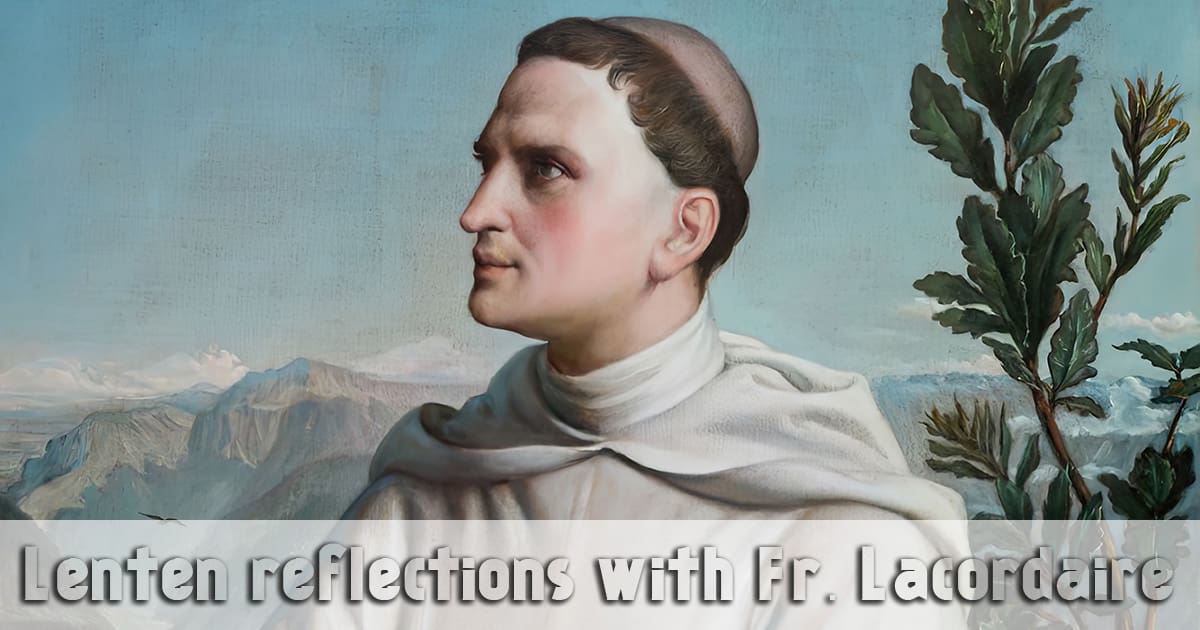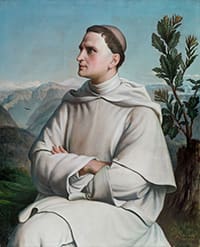Lenten Conferences of Fr. Lacordaire No. 13

Blessed are the poor in spirit
Conferences of the Rev. Père Lacordaire, p. 378-382
“Blessed are the poor in spirit for the kingdom of heaven is theirs.” You complain of the insensibility of the rich; do otherwise: love poverty, and give of the little which you have to those who have still less. Do not say that you cannot deprive yourselves of your share, if others do not the same; give yours first— the others will give theirs also. Yours will be rendered back to you a hundred-fold, and the spirit of poverty, without laws, without violence, without…division… will destroy the enmity between the poor and the rich, will make of this one a steward, and of the other a protégé of Providence.
Without doubt,… this doctrine is as simple as it is profound; no one had discovered it, however. It is the same with this doctrine as with the discovery of America by Christopher Columbus; it appeared chimerical before he succeeded, and then the whole world was surprised at not having conceived the idea: it needed only to equip a vessel and sail straight on. [Similarly,] Man was told to love his fellow-man, he who did not love him; he was told to serve him, he who only liked to be served; he was told to give his possessions, he who had a horror of giving what he possessed. Evidently the end and the means bear no proportion to each other. And notwithstanding, what has not been its success? I turn over a few pages of the New Testament, and I read— “And the multitude of the believers had but one heart and one soul; neither did any one of them say, that, of the things which he possessed anything was his own; but all things were common to them. As many as had lands and houses sold them, and brought the price of the things they sold, and laid it down before the feet of the apostles, and distribution was made to every man according as he had need.”(1) The Christian republic was formed; a republic new, unknown, in which all had but one name, —that of brother. But this republic should not be limited to a corner of the world, and to existing there as a favoured and happy sect, exhibiting to men, from far, the example of fraternity. The earth has been placed before it as the only limit of its realization; it has been called to excite and to establish everywhere the reciprocal sharing of the heart, of labour, and of possessions.
For that great work it had need of a priesthood, founded upon the principle of fraternity; this priesthood it created. It destined to the functions of government and of instruction not princes and learned men, but those among the brethren, whatever may be their birth, in whom charity shone with a greater lustre; it chose the child of the shepherd and the son of the slave; it placed upon their head the crown of the priest, the mitre of the bishop, the tiara of the pontiff, and said boldly to the princes of this world: —See to the feet of whom you must come to seek light and to receive benediction. You, Cæsars, you will some day strip off your pride— you will humble yourselves before the son of your servant who formerly occupied some obscure place in the cellars of your palace; it is to him that you will confess your faults; it is he who will stretch out his hand over you, and who will say to you: —In the name of God, Cæsar, thy sins are forgiven thee, go and do no more that which thou hast done.
The result was easy to foresee. As soon as the poor and the humble were elevated, even by the merit of humility, to the throne of teaching, and to the tribunal of conscience, human nature became invested with a dignity drawn from its very core, and from a virtue possible to all; it was no longer birth and war, chance and skill, divers sources of exclusion and of oppression; it was no longer selfishness, but charity, which held the sceptre of the destinies of humanity. Slavery lost all signification, and that without struggles between masters and slaves— without any precipitate and bloody revolution, by the course of things alone. … But to destroy slavery was not all the work of fraternity; it was still necessary to provide for the service of human miseries. Catholic doctrine created for them a gratuitous service; that is to say, a service of devotedness, without any other recompense than the strictly necessary wants of the devoted individual. This service naturally occasioned absolute chastity; it substituted the whole human race in the place of family. I will not give its history… who does not know it? Who does not know with what ingenious fecundity Catholic doctrine has provided fathers and mothers for all kinds of misfortune. Discovering in each age its chief misery, it has raised up for it on every occasion new servants. It has produced the Sister of Charity with as much ease as it made the knight of Malta, the Brother of the Christian Schools, as well as the Brother of Mercy, the friend of the lunatic as well as the friend of the leper. You have still daily under your own eyes examples of these creations, where the power of charity struggles hand to hand with the power of misery, and does not permit it to touch the most obscure point of humanity without immediately following it. Thus the reign of fraternity has become established among men; a work surpassing belief even to those who see it, and one which I must ask you to explain to me. I ask you what is the cause of so strange a phenomenon, after so many others which we have already seen. Why, and how, is it that Catholic doctrine has alone been efficacious for the abolition of servitude, for transforming the heart of the rich and the heart of the poor, for organizing that voluntary and gratuitous service which still covers Europe, notwithstanding the conspirations of so many men who strive to destroy it altogether? I ask you how this is accomplished? how it is that that Catholic doctrine, which already alone produces humility, chastity, apostleship, should be also the only doctrine able to produce fraternity? … Beauty, said we, is the unique cause of love; Catholic doctrine, then, must have invested man with a beauty which he had not before. But what beauty? If I look upon you, I see no change; your face is the one I knew formerly, and have even lost something in the correctness of the lines of your physiognomy. What new beauty have you then received? Ah! a beauty which leaves you man, and which is, nevertheless, divine! Jesus Christ has put upon you his own image; he has touched your soul with his own; he has made of you and of himself one single moral being. It is no longer you; it is he who lives in you.
(1) Acts of the Apostles, Ch. 4, v. 32, 33.
Jean-Baptiste-Henri-Dominique Lacordaire (1802-1861) was a renowned preacher and restorer of the Order of Preachers (Dominicans) in France. He was a great friend of Frederic Ozanam (in fact, he is the author of a very interesting biography on Ozanam) and very close to the Society of St. Vincent de Paul.
Image: Lacordaire, painted by Louis Janmot (1814-1892), friend of Frederic Ozanam and an early member of the Society of St. Vincent de Paul.
*Source: Conferences of the Rev. Père Lacordaire: Delivered in the Cathedral of Nôtre Dame, in Paris. Author: Jean Baptiste Henri Dominique Lacordaire. Translated from the French by Henry Langdon. Publisher: T. Richardson in 1853.








0 Comments